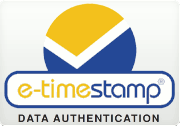Modern Protection Supplements or Substitutes Notary Services
Many people have historically used a notary to provide and enhance legal protection: turning documents into evidence.
A notary is: a witness to a person's presence and that they voluntarily applied their signature to a specific document.
A notary is not: a witness to the contents of your document; for example, they don't read each page of the document.
Now, using modern methods, the local notary method may be replaced or updated with an e-TimeStamp where the complete contents of a computer file can be authenticated; for the cost of $.40.
e-TimeStamp provides unequivocal proof that the contents of any computer file existed at a point-in-time and have not changed since that time. The digital stamp is virtually impossible to forge. A single e-TimeStamp can handle 1-1000 or more pages right from your computer - verifying the exact contents. The paper forms and cost associated with a notary is just old-fashioned for proving data authentication.
Learn how this protection applies to your business:
See how you can use e-TimeStamps backed by SecureTime to protect your work:
Digital timestamp services are not regulated by governement authorities and are not always a substitute for a traditional notary. Please review our information about meeting legal standards for using electronic records as legal evidence.
| e-TimeStamp is truly versatile: any file on your computer can be timestamped. That is one of the benefits of our new Digital Age; So many different kinds of things are captured in their digital form. To list a few:
|
The digital timestamp was defined by open standards as part of the technology called Digital Signatures, or PKI. DigiStamp uses this accepted method and then adds an external audit and certified hardware to provide a trusted web-based service. The result is strong evidence to prove that your computer files are authentic.
In general, electronic records are legally admissible in the United States if they can be reliably shown to originate with systems that provide accurate results. The accuracy of our records is supported by the code signing event and HSM birth ceremony which every timestamp can be traced back to, and which exist in public record due to the testimony of auditors. The code signing event, when the code used in every SecureTime HSM was locked down with multiple digital signatures, included a thorough review of our source code by 2 auditors. Their testimony indicates that our code correctly implements RFC 3161, an IETF standard for the evidence we create.
In the United States, "E-SIGN" is a federal law that gives electronic signatures, contracts and records the same validity as their handwritten and hard copy counterparts. (The Electronic Signatures in Global and National Commerce Act, 2000). The ESIGN law provides guidelines to eliminate legal barriers to using electronic signatures for signing contracts and storing documents. The law promotes uniformity in electronic contracting nationwide by pre-empting inconsistent state laws. Many of those laws are derived from the Uniform Electronic Transactions Act ("UETA"). The DigiStamp services are consistent with these guidelines. More information on E-Sign is here.
Company compliance with government and industry regulations - DigiStamp operates with compliance to e-signature practices set forth in 21 FDA CFR-11 and regional requirements like eIDAS (Electronic Identification and trust services). DigiStamp acting as a trust service provider, we produce electronic time stamps through use of advanced electronic seals. The medical industry is focused on two sets of regulations called HIPAA, FDA CFR-11 and GxP. Details here
Additional laws define the legal environment for DigiStamp services:
18 U.S.C. 1343 Wire Fraud
18 U.S.C. 2701 Electronic Communications Privacy Act (ECPA)
18 U.S.C. 2510 regarding electronic communications
18 U.S.C. 1028, Fraud and related activity in connection with identification documents and information
We suggest that you discuss with your attorney the specifics of your situation and we publish a legal counsel disclaimer here.
Consider that large corporations have used this technique for years as part of their proof of intellectual property rights. Now, due to the Internet technologies, this service is more universally available.
